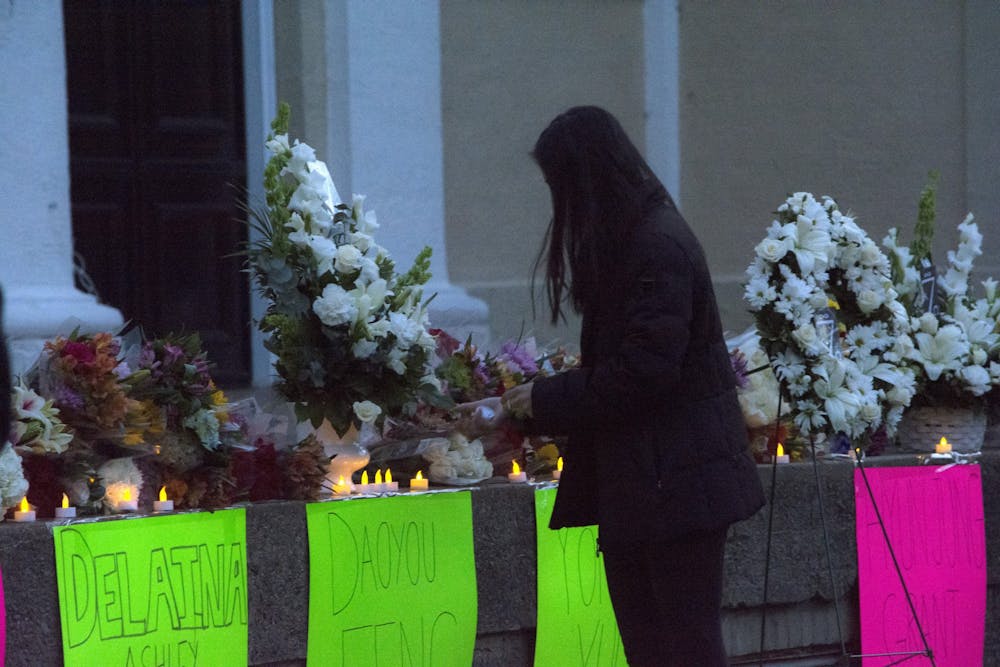Lea en español // 中文版请点击此处
A candlelight vigil was held at the McIntire Amphitheater Saturday to mourn the victims of the recent Atlanta-area shootings, six of whom were Asian women, and the lives lost as a result of the recent rise in anti-Asian hate crimes. Students, faculty and community members filled the amphitheater while respecting social distancing. Many brought flowers and candles and wrote messages in honor of the victims.
After the shootings Tuesday, members of the University community expressed outrage with the spike in violence and condemned increasing violence against Asian Americans — the Asian Student Union and other APIDA organizations released a joint statement on social media, and the University sent a statement Thursday in solidarity with Asian and APIDA students, faculty, staff and community members.
An student organizer of the event, who wished to remain anonymous, addressed the crowd, denouncing the structures of white supremacy that led to the shootings while reading the names of the eight victims — Delaina Ashley Yaun, Paul Andre Michels, Xiaojie Tan, Daoyou Feng, Soon Chung Park, Hyun Jung Grant, Suncha Kim and Yong Ae Yue.
The speaker recalled a statement from local activist and second-year College student Zyahna Bryant, who responded to the violence in a post that said, “Remember, the enemy is white supremacy.”
“I wonder how to make sense of our grieving and devastation,” they said. “Words fail, and so the question remains — where do we go from here? The enemy is white supremacy in all its forms. We must rise together today and everyday to actively deconstruct systems of oppression and white supremacy. To do nothing is to be complicit in their making.”
The shootings were particularly personal for the organizer because they have a younger sister who lives only 11 minutes from Gold Spa — one of the sites of the Atlanta shootings. The speaker then shared a piece by Chinese American poet Arthur Sze entitled “Adamant,” a powerful poem about acceptance and unity in the face of adversity.
Then, American Studies Professor Sylvia Chong talked to the crowd, expressing gratitude that the community could grieve collectively. The event, they said, was important to give a platform to Asian Americans who have been silenced.
“A lot of people have been saying that the death of Asians was due to the fact that we are silent,” Chong said. “But I am here to remind you that we aren’t silent, we are silenced … We have to claim our voice, demand to be heard, not wait for a justice system or political system to decide that our lives are not expendable.”
Chong is the founder of the Asian Pacific American Studies minor and one of the authors of an open letter sent to University administration signed by nearly 1,500 members of the University community, which pushed the University to invest in more anti-racist education, proactively address the sources of white supremacy and protect those targeted by anti-Asian violence.
Two members of the Charlottesville community, Isabella and Maya Kim, felt a personal connection to the victims of the shooting and could relate to their stories of emigration into the United States.
The Kim sisters are students at Western Albemarle High School involved in the Young Asian American and Pacific Islanders of Charlottesville organization. They have been working to get their school to condemn Asian American and Pacific Islander hate crimes and racist incidents. While they say their work has led to some policy changes, there is still work to do.
“It means a lot to see so many people out here supporting us and being able to resonate with our stories,” Isabella Kim said.
Fourth-year Nursing student Jae Guerrant was also grateful to have an event that gave time to reflect on the hate crimes against Asian Americans in the last year. In the last year, anti-Asian hate crimes in America’s 16 largest cities have increased by 149 percent according to research conducted by The Center for the Study of Hate and Extremism.
He cited anti-Asian American rhetoric around the COVID-19 pandemic as exacerbating this violence and spoke on his experience as a Black Asian American.
“This event means a lot to me because I am Black and Filipino,” Grant said. “With the tragic death of George Floyd, but also being a part-Asian clinician, it’s been very tough seeing violence on both sides and carrying about the wellness of my family. Racism lives everywhere.”
Correction: This article previously listed the Kim sisters as founders of Young AAPI of Charlottesville. It has been updated to reflect that they are involved but not founders. Isabella is an officer, and Maya is a member.







